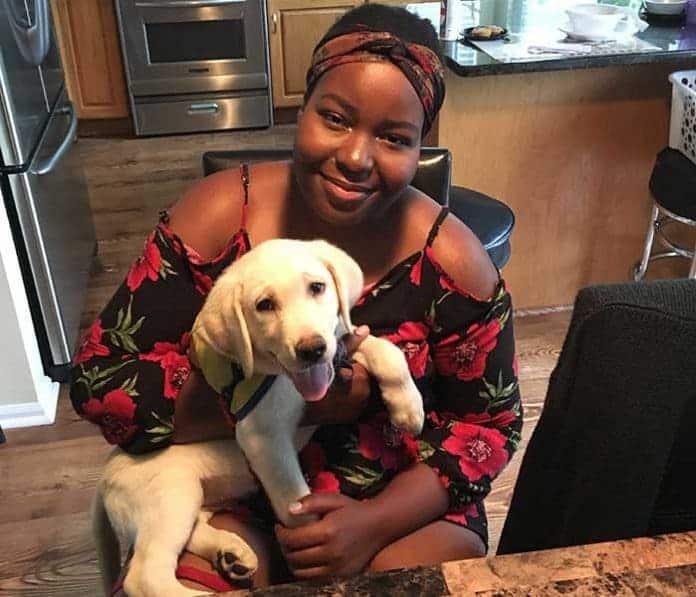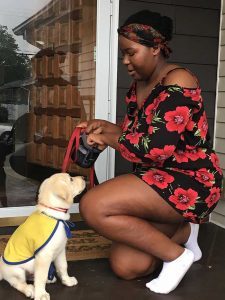
BRICK – St. Peter’s University students Precious Braswell, 18, and Ayanna Patterson, 19, will have their hands full when they return to school this fall, because in addition to their full course load of classes, the roommates will be raising an assistance dog that will eventually be matched with a child or an adult with disabilities.
The young women are volunteer puppy raisers for Canine Companions for Independence (CCI), a national non-profit organization that provides assistance dogs for children, adults and veterans with disabilities.
The puppy raisers bring a puppy into their home when it is eight weeks old and raise it, teaching it 40 basic commands and socialization skills before returning it to CCI for additional training.

Meanwhile, “Traveler,” a three-month-old male Labrador Retriever/Golden Retriever mix, will be spending the summer at the shore with Braswell and her mother, Marion, at their home in the Sandy Point section of Brick.
Ayanna always had dogs, and she talked Precious into joining the Puppy Club at St. Peter’s University. The club’s moderator, Dr. Patricia Redden, had raised several puppies for CCI and told the students about the organization.
Dr. Redden was trying to get some of the commuting students to become volunteer puppy raisers, and Precious and Ayanna were interested, but they live on campus.
“We thought it would be a good idea to try out, to see if we could raise a puppy on campus,” Precious said from her Brick home recently.
Dr. Redden worked with the dean of admissions at St. Peter’s University, and at the end of May the school contacted Precious and Ayanna to let them know they had gotten permission for the pilot program, and assigned them a room.
“We were waiting a long time. We were unsure whether it would happen,” Precious said. “We were more excited than surprised.”
Once they got the green light from school officials, they applied for a puppy online, and shortly afterwards, CCI got in touch with the girls for a phone interview.
“They told us what CCI is, and then they sent emails to us that had training videos that demonstrate how to correctly raise the puppy, including tips we could refer back to,” Precious said.
The puppies are on a time schedule. Between the ages of two and four months they learn 10 basic commands, such as “sit,” “stay,” “kennel,” and “let’s go.”
Between the ages of four to six months they learn 10 more complex commands, and 10 more between the ages of six and ten months.
“I never had a pet before,” Precious said. “It’s definitely a lot of responsibility, especially how often I have to walk him. But he’s very intelligent, especially when he wants something.”
When Traveler is about a year and a half old, he will be returned to CCI regional headquarters in Medford, NY where they will begin six months of training with professional instructors before being matched with a disabled child or adult.

“It’s going to be a sad process. I heard that there is a lot of crying at puppy graduation, but it’s also a good thing,” Precious said.
She said she hopes to stay in touch with Traveler’s owner to see how he’s doing.
“I think about who the dog will help when the time comes, and how he will help them,” she said.
Precious’s mother, Marion, who owned poodles when she was younger, agreed.
“It’s going to be a sad day for both of us. The dogs are like family members,” she said.
“I try to help with Traveler, but I get scolded,” Marion joked. “He has to be trained a certain way, so Precious corrects me all the time. I appreciate that it’s a lot of responsibility, but she and Ayanna are up for the task without a doubt,” said Marion, who is a middle school teacher in East Orange.
Canine Companions for Independence is the largest non-profit provider of trained assistance dogs with six regional training centers across the country. Established in 1975, CCI provides highly trained assistance dogs to children and adults with disabilities and is recognized worldwide for the quality of its dogs, and quality and longevity of the matches it makes between dogs and people. There is no charge for the dog, its training, and ongoing follow-up services. For more information, visit cci.org or call 1-800-572-BARK.







